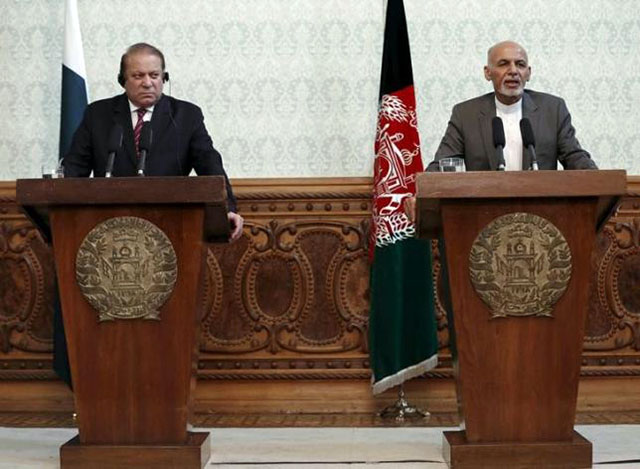The Afghan government is once again attempting to improve relations with Pakistan and, with Pakistan’s help, revive the stalled peace efforts to bring the Taliban on negotiation table and end the bloody conflict in the country. According to reports, President Ashraf Ghani has met Pakistani Prime Minister Nawaz Sharif on the sidelines of the Paris climate change summit to discuss the two country’s bilateral relations and the peace process in Afghanistan. The president expressed optimisms for improvement of relations between Kabul and Islamabad which could serve for as a “preclude for the resumption of peace talks with the Taliban”. The President is expected to visit Pakistan in the coming days and attend the international gathering Heart of Asia on Afghanistan. The attempts to revive the peace talks are coming at a time when the war is unabatedly being waged in Afghanistan and various militant groups are operating across the country.
In the post-Taliban era in Afghanistan, the Kabul-Islamabad relations have been shaped predominantly by the Afghan government’s efforts to reach a peace deal with the Taliban. Afghanistan’s relations with the neighboring Pakistan, who is believed to have influence over the Taliban leadership, have seen many ups and downs during past fourteen years of war and peace efforts in Afghanistan. President Karzai’s administration lacked a sustainable and cohesive approach towards Pakistan’s role in the Afghan peace efforts. At some points, Hamid Karzai chose to severely criticize Pakistan, accusing it of supporting the Taliban insurgency. This was while he also struggled to win Islamabad’s backing for bringing the Taliban to peace negotiations. His approach, however, helped neither the peace process nor the war efforts against the insurgent groups.
Taking power in Afghanistan, the National Unity Government (NUG) did a U-turn over Afghanistan’s relations with Pakistan. The relations between Afghanistan and Pakistan improved quickly but did not sustain for a long time. It was expected that NUG would resume formal peace talks with the Taliban with Pakistan’s help in the process. However, the announcement of Taliban leader Mullah Omar’s death led to a deep division among the Taliban leadership which culminated to split of the militant group into two bitter rival groups. The announcement of Mullah Omar’s death and Mullah Mansoor’s succession resulted to suspension of the peace efforts at a time when the government of Afghanistan was set to kick-start formal peace negotiations with the Taliban. With the bloody insurgent attacks during the fighting summer, the government of Afghanistan severely criticized Pakistan. This was the end of an era of improvement of relations between Pakistan and Afghanistan which had the potential to kick-start formal peace talks with the Taliban. Since then, Afghan officials have continued to blame Pakistan for allowing its soil to be used by the militant groups waging the insurgency in Afghanistan. With various militant groups operating across the country, the prospect of the war efforts in the country seems to be uncertain more than any time before. Both the Afghan and Pakistani governments assert that the war has no solution but through diplomatic means. However, the prospect for peace talks is also dim as the rival militant groups rarely seek unified agendas against the government of Afghanistan and the NATO alliance. As the President pointed to the issue, the peace talks may have a chance of success with only some of the militant groups who are willing to come to the table of negotiations, while for others, the war would inevitably continue for the years, and even decades, to come. This leaves the peace efforts open to a critical question: does any sort of peace talks which do not include all the militant groups sustain in the future?
Pakistan still is believed to have considerable influence over the main Taliban group led by Mullah Akhtar Mansoor. The country’s role in the Afghan peace efforts, however, is looked into with skepticisms and disbeliefs. Afghan officials accuse Pakistan of not genuinely supporting the Afghan peace process. The recent overture by both Pakistan and President Ashraf Ghani to resume the halted improvements in relations with Pakistan shows how Afghan government sees Pakistan as an indispensible element in the peace talks with the Taliban and how important is the peace process for Pakistan as well. It is true that the peace efforts include only a part of the militant groups, Pakistan holds considerable influence over the main Taliban group. This is something the government of Afghanistan will count on the long term for reaching a peace deal with the Taliban.
The recent pause in improvement of relations between the two countries has left the peace efforts affected. The two countries have now a long path to go to restore sufficient trust and confidence for revival of the peace process in Afghanistan. The two countries need to overcome distrusts and reach a common ground over a sustainable peace process in Afghanistan. With emergence of many more militant groups in Afghanistan, reaching peace with the militant groups is difficult than ever. President Ghani’s upcoming Pakistan trip provides a chance for reviving mutual confidence over the peace efforts in Afghanistan. Ashraf Ghani has once again mentioned a timespan for improvement of relations between Kabul and Islamabad aimed at resuming the peace efforts. The two countries will need to reach a common ground over the peace initiative in Afghanistan that includes all important aspects of both the bilateral relations and the peace process in Afghanistan. Both sides need to refrain from blame games and focus on the task ahead. Pakistan needs to do all it can to convince the Taliban for a ceasefire. The country will be able to play a crucial role in the peace process if it manages to convince the Taliban for cease of the insurgency in Afghanistan. Every start of fighting seasons brings tensions into the relations between the two countries and directly harms the Afghan peace process. Both leaders need to ensure that wars and adverse security conditions do not severely affect the two countries’ cooperation over the peace process.

